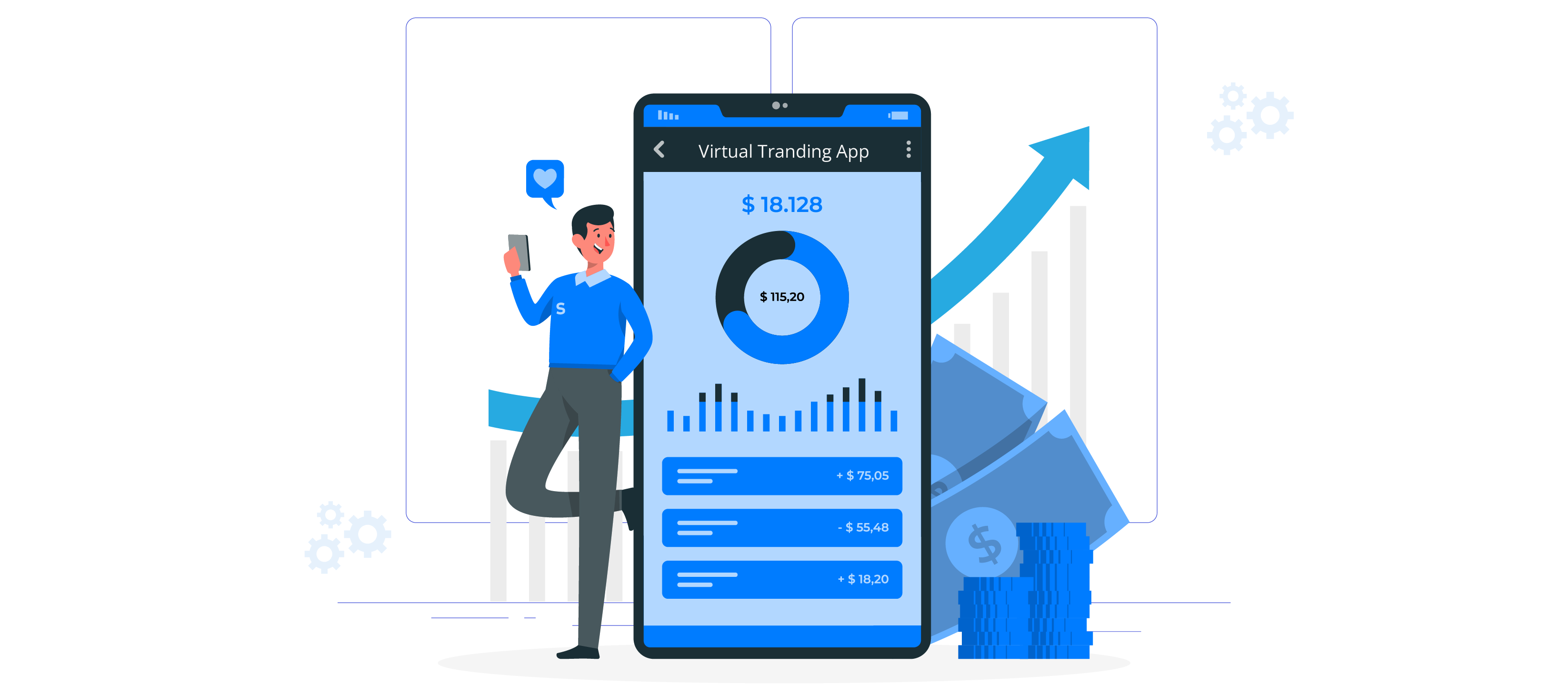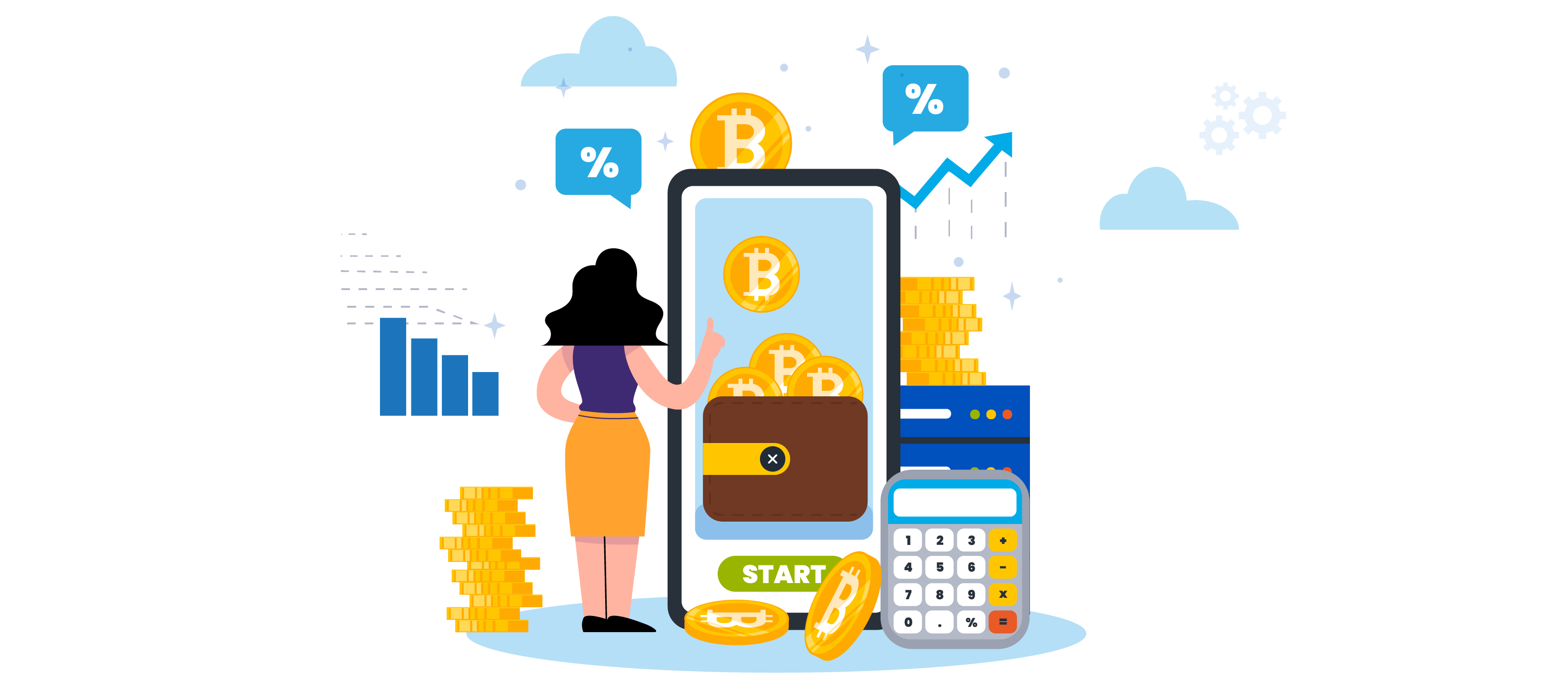Step into the exciting world of virtual trading apps, where you can embark on a risk-free adventure in the world of stocks and investments. Curious to explore these virtual playgrounds for traders? Look no further! This article lists the 20 best virtual trading apps to ignite your passion for investing.
Gone are the days when one had to be physically present on a trading floor to buy and sell stocks or currencies. Imagine a scenario where you can easily engage in trading while comfortably sitting at a coffee house. This remarkable feat is made possible by the emergence of virtual trading apps. These innovative applications have transformed how people learn and practice trading without risking real money. Users can explore various investment strategies, analyze market trends, and execute trades using virtual currency instead of real funds.
According to Statista, The global online trading market is anticipated to develop at a compound annual growth rate of 6.4 percent, reaching an estimated 13.3 billion US dollars in 2026.With a plethora of on -demand virtual trading apps available, it can be overwhelming to choose the right one. Hence, this blog will explore the “20 Best Virtual Trading Apps” to help you make an informed decision. So grab a cup of coffee, sit back, and embark on an exciting journey into the realm of virtual trading apps.
What are Virtual Trading Apps?

Virtual trading apps, also known as stock market simulators or paper trading apps, allow individuals to practice trading stocks, options, cryptocurrencies, or other financial instruments in a simulated or virtual environment. These apps provide a risk-free platform where users can learn about investing and trading strategies without using real money.
Here’s how virtual trading apps typically work:
- Simulated Environment: Virtual trading apps create a simulated trading environment that mimics real-world market conditions. Users are given virtual money or a virtual portfolio to invest in various assets.
- Market Data: These apps use real-time or delayed market data to reflect the current prices and fluctuations of stocks or other assets. This allows users to experience the market dynamics without the actual financial risk.
- Trading Tools: Virtual trading apps offer a range of trading tools and features that users can utilize to analyze stocks, place trades, set up alerts, and track their performance. These tools include charts, news feeds, research resources, and risk management features.
- Educational Resources: Many virtual trading apps provide educational resources such as tutorials, articles, videos, and webinars to help users understand the fundamentals of investing and trading. These resources aim to improve users’ financial literacy and trading skills.
- Social Features: Some virtual trading apps incorporate social features, allowing users to interact with other participants. This can include features like leaderboards, competitions, chat rooms, or the ability to follow and learn from successful traders.
- Performance Tracking: Virtual trading apps track users’ performance, including gains or losses, portfolio value, and overall returns. This enables users to assess their trading strategies, identify areas for improvement, and track their progress over time.
Pros and Cons of Virtual Trading Apps
| Pros | Cons |
| Risk-free learning environment | Lack of emotional involvement and real-money impact |
| Opportunity to practice trading strategies | Potential deviation from real market conditions |
| Access to real-time market data | Limited experience with real-time trading execution |
| Availability of trading tools and features | Inability to capture psychological aspects of trading |
| Portfolio tracking and performance monitoring | Possibility of developing unrealistic expectations |
| Convenient and accessible | Reliance on simulated data |
Comparison of Best Virtual Trading Apps
| Virtual Trading Apps | Platform | Availability | Features | User Reviews |
| Investopedia Stock Simulator | Web | Worldwide | Real-time market data, Customizable portfolios, Educational resources | 4.5/5 |
| TD Ameritrade thinkorswim PaperMoney | Web, Mobile | United States | Advanced charting, News and analysis, Backtesting capabilities | 4/5 |
| Wall Street Survivor | Web, Mobile | Worldwide | Interactive courses, Trading contests, Social trading community | 4/5 |
| MarketWatch Virtual Stock Exchange | Web | Worldwide | Stock market challenges, Trading leagues, Virtual rewards | 3.5/5 |
| Stock Trainer: Virtual Trading | Mobile | Worldwide | Real-time quotes, Trading simulator, Multiple markets and currencies | 4/5 |
| Best Brokers: Stock Simulator | Mobile | Worldwide | Realistic trading experience, Different order types, Leaderboards | 4/5 |
| TradingView Paper Trading | Web, Mobile | Worldwide | Advanced charting tools, Social networking, Backtesting strategies | 4.5/5 |
| Fantasy Stock | Mobile | Worldwide | Virtual cash tournaments, Portfolio analysis, Stock research tools | 4/5 |
| Forex Game | Mobile | Worldwide | Currency trading simulation, Real-time quotes, Educational quizzes | 4/5 |
| Stock Wars: Virtual Investing | Mobile | Worldwide | Social trading features, News feeds, Stock market games | 3.5/5 |
| TradeHero | Mobile | Worldwide | Real-time trading, Social trading community, Leaderboards | 4/5 |
| Wall Street Magnate | Web, Mobile | Worldwide | Virtual trading competitions, News and research, Virtual rewards | 3.5/5 |
| HowTheMarketWorks | Web | Worldwide | Stock market challenges, Educational resources, Trading tools | 4/5 |
| BullBear | Mobile | Worldwide | Virtual trading contests, News and analysis, Social trading features | 4/5 |
| Chartgame | Web | Worldwide | Chart analysis practice, Historical data, Interactive learning | 3.5/5 |
| Stockfuse | Mobile | Worldwide | Realistic trading environment, Trading competitions, Performance analytics | 4/5 |
| Upstox Virtual Trading | Web, Mobile | India | Simulated trading platform, Real-time data, Educational content | 4.5/5 |
| VSE – Virtual Stock Exchange | Web | Worldwide | Virtual stock market game, Stock research tools, Customizable portfolios | 3.5/5 |
| TrakInvest | Web, Mobile | Worldwide | Social trading platform, Virtual trading challenges, Learning modules | 4/5 |
| Kapitall | Web | United States | Virtual stock market game, Customizable portfolios, Educational resources | 4/5 |
Best Virtual Trading Apps

1. Investopedia Stock Simulator –
The Investopedia Stock Simulator is a virtual trading platform offered by Investopedia, a popular financial education website. It lets users practice trading stocks and other securities without using real money. The simulator provides a realistic trading environment where users can create a portfolio, place trades, and track their performance. It offers features like real-time quotes, customizable trading options, and access to historical data to help users learn and refine their trading strategies.
2. TD Ameritrade thinkorswim PaperMoney –
TD Ameritrade’s thinkorswim platform includes a virtual trading feature called PaperMoney. It allows users to practice trading using virtual money in a simulated environment. The platform provides various trading tools and features, including advanced charting, technical analysis, and real-time market data. With PaperMoney, users can test various trading strategies, simulate trades, and monitor their performance without risking real capital.
3. Wall Street Survivor –
Wall Street Survivor is an online platform that offers a virtual trading experience. It educates users about investing and trading in stocks, options, and other financial instruments. Users can create virtual portfolios, execute trades, and compete with other users in virtual trading competitions. Wall Street Survivor provides educational resources, tutorials, and interactive lessons to help users learn about investing and improve their trading skills.
4. MarketWatch Virtual Stock Exchange –
MarketWatch Virtual Stock Exchange is an online platform that allows users to simulate trading stocks, options, and other financial instruments in a virtual environment. It provides a realistic stock market experience where users can create virtual portfolios, track their performance, and compete against other users. The platform provides real-time market data and allows users to place virtual trades based on market conditions. It is a popular tool for beginners to learn about investing and practice their trading strategies without risking real money.
5. Stock Trainer Virtual Trading –
Stock Trainer is a virtual trading app for beginner and advanced investors. It provides a simulated trading environment where users can practice trading stocks, options, and other securities. The app offers many features, including real-time quotes, interactive charts, and educational resources. Users can create virtual portfolios, execute trades, and track their performance over time. Stock Trainer aims to provide a real trading experience and help users develop their investment skills and knowledge.
6. Best Brokers :Stock Simulator –
Best Brokers is a virtual trading app that allows users to simulate trading stocks, forex, and other financial instruments. The app offers real-time quotes and charts, as well as a variety of order types and trading options. Users can create virtual portfolios, trade with virtual funds, and monitor performance. Best Brokers also includes educational features like tutorials and quizzes to help users learn about investing and improve their trading strategies. It is designed to be user-friendly and suitable for beginners and experienced traders.
7. TradingView Paper Trading –
TradingView is a popular real-time stock and cryptocurrency chart analysis platform. It also offers a paper trading feature, which allows users to practice trading without using real money. With TradingView’s paper trading, users can create virtual portfolios, execute trades, and track performance using simulated funds. The platform provides advanced charting tools, technical indicators, and drawing tools to aid market analysis. Users can test different trading strategies, experiment with various investment techniques, and learn how to use the platform effectively before engaging in live trading.
8. Fantasy Stock –
Fantasy Stock is a virtual trading app that allows users to simulate trading stocks in real time. It offers a fantasy stock market experience where users can create portfolios, buy and sell stocks, and track their performance. The app typically provides virtual currency or points that users can use to invest in different stocks and compete against other players.
9. Forex Game –
Forex Game is a virtual trading app focused on foreign exchange (forex) trading. It provides a simulated trading environment where users can trade different currency pairs without using real money. The app aims to educate users about forex trading concepts, such as buying, selling, and exchanging currencies, and understand market trends and indicators.
10. Stock Wars –
Virtual Investing: a virtual trading app that allows users to practice investing in stocks and ETFs (Exchange-Traded Funds). Users can create a portfolio, research and select stocks, and execute trades based on real-time market data. The app often incorporates social features, enabling users to follow and interact with other investors and participate in virtual competitions.
11. TradeHero –
TradeHero is a virtual trading app designed to help users learn and practice trading stocks, options, and cryptocurrencies. It offers a realistic trading simulation where users can trade with virtual money based on real market data. TradeHero also provides educational resources, such as tutorials and expert tips, to help users improve their trading skills and knowledge.
12. Wall Street Magnate –
Wall Street Magnate is a virtual trading app that simulates the experience of investing in stocks, options, and other financial instruments. It provides a platform for users to create and manage their virtual portfolios, execute trades, and analyze market trends. Wall Street Magnate also offers features like leaderboards, competitions, and social interactions to engage users and foster community.
13. HowTheMarketWorks –
HowTheMarketWorks is a virtual trading platform that allows users to simulate real-world trading in stocks, options, and mutual funds. It provides users a virtual portfolio and real-time market data to make trades and track their performance. The platform offers educational resources and tutorials to help users learn about investing and improve their trading skills.
14. BullBear –
BullBear is another virtual trading app that offers a simulated trading experience. It allows users to practice trading stocks, options, futures, and cryptocurrencies without using real money. Additionally the app provides real-time market data, technical analysis tools, and a social community where users can share trading ideas and strategies.
15. Chartgame –
Chartgame is a virtual trading game that teaches users about technical analysis and chart patterns. It presents users with historical stock charts and asks them to predict the future direction of the stock. It’s a fun and interactive way to learn about charting techniques and improve one’s ability to analyze stock price movements.
16. Stockfuse –
Stockfuse is a virtual trading app that aims to simulate real-world trading and connect users with potential employers in the finance industry. Users can trade stocks, options, and futures using virtual money and compete with other users in trading competitions. Stockfuse also provides trading tools, analytics, and market data to help users make informed trading decisions.
17. Upstox Virtual Trading –
Upstox is an online brokerage platform that offers a virtual trading feature for users to practice trading without using real money. It provides a virtual trading account with access to real-time market data, charts, and trading tools. Users can trade in various segments, including stocks, futures, options, and commodities, and track their performance to improve their trading skills.
18. VSE – Virtual Stock Exchange –
VSE is an online platform that allows users to participate in virtual stock trading. It provides a simulated stock market environment where users can buy and sell stocks, track their portfolios, and compete against other virtual traders. The app offers real-time stock prices and a variety of trading options, including limit orders, stop-loss orders, and short selling. It’s primarily designed for educational purposes, allowing individuals to learn about investing and practice trading strategies without the risk of losing real money.
19. TrakInvest –
TrakInvest is another virtual trading app that aims to educate users about stock trading and investment strategies. It provides a virtual trading platform for trading stocks, commodities, and currencies. The app also offers a social networking aspect, allowing users to connect with other traders, share insights, and participate in trading competitions. With these the platform provides virtual money for users to invest and track their performance over time.
20. Kapitall –
Kapitall is a virtual trading platform that combines investing with gamification elements. It offers a user-friendly interface and interactive features to engage users in learning about investing and trading. Kapitall allows users to create virtual portfolios, research stocks, and execute virtual trades. Additionally, It also incorporates educational resources like articles and tutorials to help users understand investing concepts.
Difference Between Real Trading and Virtual Trading
Real and virtual trading are two distinct approaches to engaging in financial markets. Here are the key differences between them:
- Real Money vs Simulated Environment: In real trading, you use actual money to buy and sell financial instruments, such as stocks, bonds, commodities, or currencies. This involves real financial risk and potential rewards. On the other hand, virtual trading, also known as paper trading or simulated trading, takes place in a simulated environment where no actual money is involved. Instead, you trade with virtual funds provided by the platform.
- Risk and Emotional Factors: Real trading exposes you to the actual risks of the market. Gains and losses directly impact your financial position. This involvement of real money often induces emotions like fear, greed, and stress, which can influence decision-making. Since no real money is at stake in virtual trading, the emotional aspect is minimized. It allows traders to experiment, learn, and gain confidence without the pressure of financial consequences.
- Market Realism: Real trading occurs in live market conditions, reflecting real-time prices and liquidity. The trades you execute can potentially affect the market and be impacted by other participants. Virtual trading platforms simulate market conditions but may not perfectly mirror the intricacies of real-time trading. The execution of trades in virtual trading might not have the same impact on the actual market.
- Execution and Slippage: When you trade with real money, the execution of your orders is subject to market conditions, including bid-ask spreads and slippage. Slippage refers to the difference between the expected price of a trade and the price at which it is executed. In virtual trading, trades are usually executed instantly at the displayed prices, which may not reflect the slippage that can occur in real trading.
- Learning and Skill Development: Virtual trading is often used as a learning and skill development tool. It allows beginners to understand market dynamics, practice trading strategies, and gain familiarity with trading platforms. It is a safe environment to experiment with different approaches and evaluate their effectiveness. On the other hand, real trading provides practical experience and real-time feedback on the effectiveness of your strategies. It exposes you to the complexities and challenges of managing actual financial positions.
Real and virtual trading have their merits and serve different purposes. Virtual trading can be an excellent starting point for new traders to gain confidence and knowledge before venturing into real trading. On the other hand, real trading offers the potential for financial gains and losses, providing hands-on experience in the real market environment.
Conclusion
To conclude, Virtual trading apps provide a risk-free environment for individuals to learn and practice trading stocks and other financial instruments. These apps simulate real market conditions, allowing users to buy, sell, and track investments without using real money. If you’re looking for the best virtual trading apps, here are 20 options: VSE – Virtual Stock Exchange, TrakInvest, Kapitall, and many others. These apps offer educational resources, real-time market data, and interactive features to enhance the learning experience. Start honing your trading skills today with these top virtual trading apps!
FAQs
Question 1: What are virtual trading apps?
Virtual trading apps are mobile or web applications that allow users to simulate trading in financial markets without using real money. They provide a risk-free environment for individuals to learn and practice trading strategies, understand market dynamics, and gain experience buying and selling stocks, commodities, cryptocurrencies, or other financial instruments.
Question 2: How do virtual trading apps work?
Virtual trading apps typically use virtual or simulated money to replicate real market conditions. Users create an account, receive a virtual balance, and can then explore various investment options. These apps often provide real-time market data, charts, and News to help users make informed trading decisions. Users can place trades, track performance, and analyze strategies without financial risk.
Question 3: What are the benefits of using virtual trading apps?
Virtual trading apps offer several benefits, including:
- Risk-free learning
- Market experience
- Test investment strategies
- Education and skill development
- Confidence building
Question 4: What features should I look for in a virtual trading app?
When choosing a virtual trading app, consider the following features:
- Real-time market data
- Variety of financial instruments
- User-friendly interface
- Simulation accuracy
- Educational resources
Question 6: Can virtual trading apps help me become a better investor?
Yes, virtual trading apps can help you become a better investor by providing a risk-free platform to practice and refine your trading strategies. Through simulated trading, you can learn about market dynamics, test different approaches, and understand the impact of various factors on your investment decisions. Virtual trading apps can be valuable for gaining experience and building confidence before entering the real financial markets.
Question 7: What are some of the best virtual trading apps available?
Here are 20 popular virtual trading apps (in no particular order):
- Forex Game
- Stock Trainer: Virtual Trading
- MarketWatch Virtual Stock Exchange
- BullBear
- Best Brokers: Stock Simulator
- TradeHero





